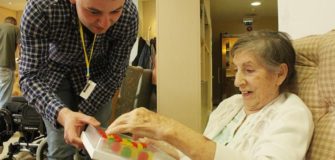Among one of the many challenges in caring for older people with dementia, is dehydration. Why? When you suffer from dementia, the part of the brain that checks and sends a message to let you know you’re thirsty doesn’t function properly. This is because the kidneys become less active over time, and they are responsible for producing the hormonal response to dehydration.
Dementia patients forget where their water is, even if it’s nearby. Some even forget to swallow or how to drink.
Symptoms of Dehydration
• Increased confusion (compared to typical dementia symptoms);
• Dark and strong-smelling urine;
• Dry mouth, lips and eyes;
• Headaches or dizziness;
• Feeling tired;
• Urinating fewer than 4 times a day.
Preventing Dehydration for Dementia Patients
- Leave glasses or jugs of water within easy reach – This is especially important for people with limited mobility who aren’t able to get up and get themselves a drink.
- Make drinking easier – Have a clear glass so the person can see what’s inside (this may not work so well with water) or a brightly coloured plastic cup to draw attention. Make sure the glass is within the line of sight and within reach.
- Schedule a drink regularly – Enjoy a cup of tea, water, or flavoured water with the person and make sure they’re drinking during meal
- Leave reminders – If your patient is still functional and can live alone in the house. Leave notes out around the house. You can also send them messages or phone calls.
- Provide food with high fluid content – Besides water, tea or juice. Some good options include gelatin ice cream, soup, and high water-content fruits such as watermelon, canteloupes, or oranges. This is where edible water jelly drops can be of help.
Reference: https://www.highspeedtraining.co.uk/hub/symptoms-of-dehydration-dementia/





























